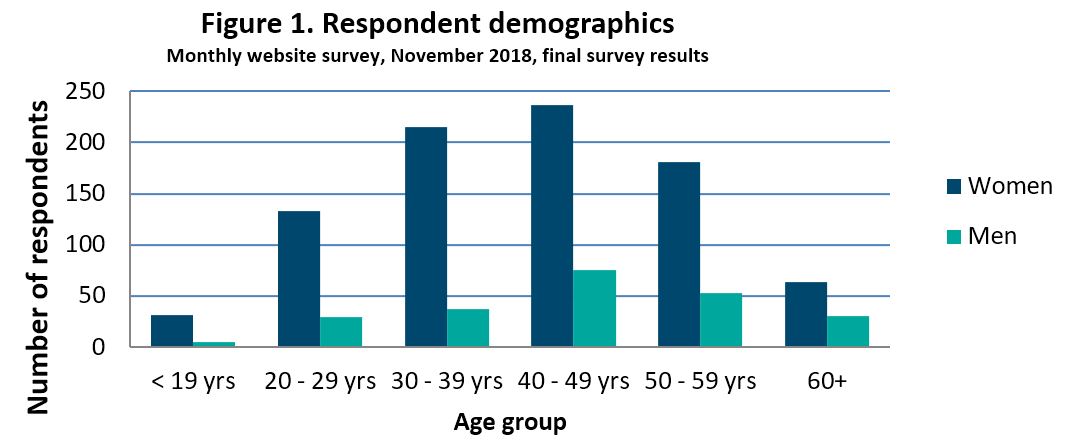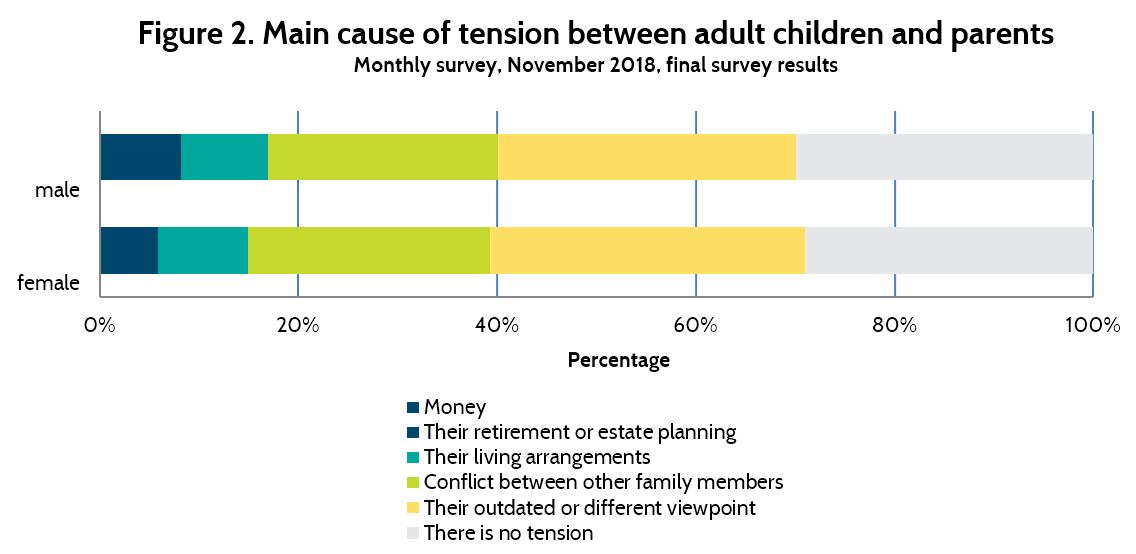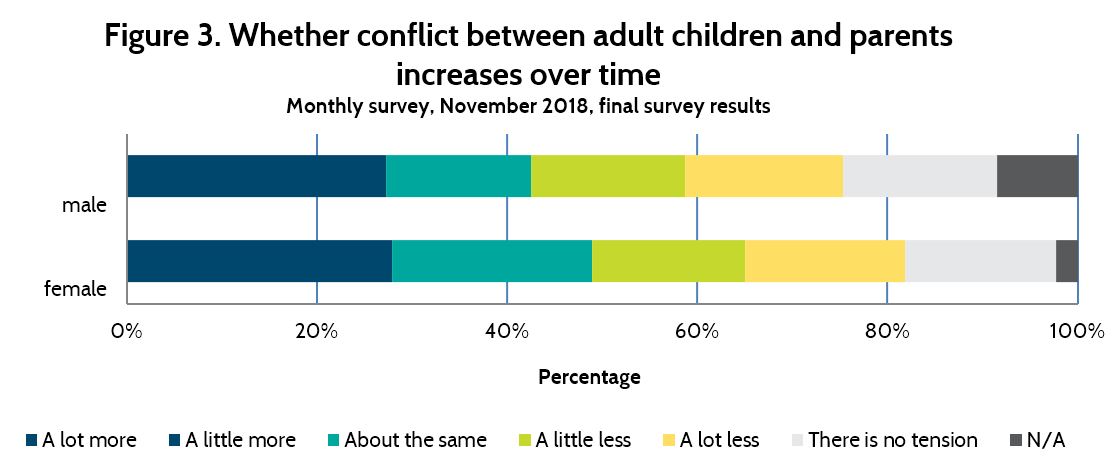Introduction
Would you like to be notified when a new survey report is released? Sign up here
Underpinning many contemporary discussions of family relationship issues is the impact of demographic ageing on the structure of modern families. Decreasing birth rates and increasing life expectancy, along with changes in partnering, re-partnering, separation and divorce, have affected the shape and complexity of the modern family. It is now common for people in middle to late adulthood to have living parents, with demographic ageing operating to extend the shared life span of parents and adult children. This can bring about new roles, expectations and potential sources of support, but also may increase the risk of conflict and strain (Ferring, 2009), especially where there are requirements for extended periods of care.
Relationships between adults and their parents are different to other social and familial relationships due to their long shared history and changes in child-parent dependencies from infancy through adulthood, and the quality of these evolving relationships has far reaching impacts on both adult child and parental well-being. In their review of ageing and family life, for example, Silverstein and Giarrusso (2010) discussed the association between strong, positive relationships between aging parents and their adult children and reduced risk of dementia. There is also evidence that the extent to which adult children support their ageing parents depends to a large extent on adult children’s emotional relationship quality with their parents (Merrill, 1997).
This month’s online survey report further explores our interest in the dynamics of family relationships and ageing by asking visitors to our website to answer a few questions about their relationships with their ageing parents.
Previous research finds that…
- Relationships between daughters and mothers have been repeatedly found to be the closest kind of child–parent relationships (for example see Lawton et al. 1994).
- Women have been found to experience more strain in relationships with parents due to normative expectations to provide support and care for their ageing parents while at the same time having to care for their own growing children (Brody 1999).
- High quality intergenerational relationships are associated with improved ability to navigate the challenges of intergenerational support provision and receipt for both generations: parents and children (Merz et. al. 2009).
Results
More than 1150 people responded to the Relationships Australia online survey in November 2018. Just under 80 per cent of survey respondents (78%) identified as female, with more females than males responding in every age group (figure 1). Eighty-seven per cent of survey respondents were aged between 20‑59 years, and more than 50 per cent of respondents comprised women aged between 30-49 years (inclusive).
As for previous surveys, the demographic profile of survey respondents remains consistent with our experience of the groups of people that would be accessing the Relationships Australia website.

More than eighty per cent of male (82%) and female (83%) survey respondents reported they had ageing or elderly parents.
Fifty-eight per cent of female survey respondents rated their relationships with their parents as excellent or very good, while 51 per cent of male survey respondents rated their relationships with their parents as excellent or very good. A further one-quarter of female (26%) and male (27%) survey respondents rated their relationships with their parents as good, while one-sixth rated their relationships with their parents as poor.
The majority of survey respondents reported the main cause of conflict between them and their parents was their outdated or different viewpoint (men – 26%; women – 30%) or conflict between other family members (men – 20%; women – 23%). Parental living arrangements was the main cause of conflict between them and their parents for 8 per cent of survey respondents (figure 2).

More than one-quarter of men and women reported that the conflict between them and their ageing parents has increased over time (figure 3), while one-third of survey respondents reported the tension in their relationships with their parents has decreased over time. Twenty-one per cent of women and 15 per cent of men reported the levels of tension had remained about the same.

Despite reports of tension in relationships, 80 per cent of women and 71 per cent of men reported they contacted their ageing parents more than once a week, and a substantial majority expected they would have caring responsibilities for ageing parents, should the need arise. Seventeen per cent of adult female and 13 per cent of adult male survey respondents expected that they would be the sole carer of their ageing parent, while a further 49 per cent of female and 41 per cent of male survey respondents expected to share the care of their ageing parent(s) with their siblings. Fewer than ten per cent of survey respondents expected an aged care facility to care for their ageing parents when they were in need of assistance.
References
Brody, E., M. (1999). Women in the middle: their parent-care years. New York: Springer.
Ferring, D., Michels, T., Boll, T. & Filipp, S. (2009). Emotional relationship quality of adult children with ageing parents: on solidarity, conflict and ambivalence. European Journal of Ageing, 6(4), 253-265. doi: 10.1007/s10433-009-0133-9.
Fingerman, K., L. & Birditt, K., S. (2011). Handbook of the Psychology of Aging (Seventh Edition), 219-232, https://doi.org/10.1016/B978-0-12-380882-0.00014-0
Lawton, L., Silverstein, M., Bengtson, V.,L. (1994). Affection, social contact, and geographic distance between adult children and their parents. Journal of Marriage and Family, 56:57–68. doi: 10.2307/352701.
Merz, E., Consedine, N., Schulze, H., & Schuengel, C. (2009). Wellbeing of adult children and ageing parents: associations with intergenerational support and relationship quality. Ageing & Society, 29(05), 783-802. doi: 10.1017/s0144686x09008514.
Merrill, D. (1997). Caring for elderly parents: juggling work, family, and caregiving in middle and working class families. Westport: Auburn House/Greenwood.
Silverstein, M., & Giarrusso, R. (2010). Aging and Family Life: A Decade Review. Journal of Marriage and Family, 72(5), 1039-1058. doi: 10.1111/j.1741-3737.2010.00749.x
